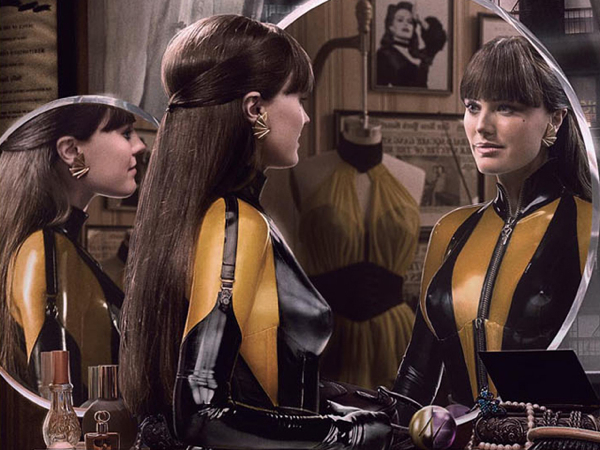Movie review by Greg Carlson
Curmudgeonly cult hero Alan Moore makes mere mortals jealous with his super-powered ability to have his cake and eat it. Perpetually grousing about the ways in which Hollywood hacks butcher his source material, he drums up all sorts of extra publicity for projects that aren’t worthy of it, keeping his name in the press even as he removes it from the credits of the films. He has been called a genius for his dystopian visions, but a real mark of his intelligence is that he maneuvers into win-win situations any time one of his comic books makes the trek to the big screen. If the movie adaptation is terrible – which is often the case – Moore lands in the “I told you so” position, and fans snap up more copies of the printed material to see why the movie failed to measure up. If the movie works, critics credit Moore’s originals as the reason for the success.
“Watchmen” is the crown jewel in Moore’s oeuvre, and movie deals were in the works not long after the twelve issue comic book series concluded in 1987. Over the years, directors Terry Gilliam, Darren Aronofsky, and Paul Greengrass all flirted, to varying degrees, with the material. Zack Snyder finally brings “Watchmen” to the screen, and in spite of scoffing and derision from many longtime devotees, he manages to present a vision largely compatible with the source. Yes, many have remarked that the episodic presentation of the original stories in monthly chapters might have been better served as a television miniseries, but Snyder’s uncanny reproductions of artist Dave Gibbons’ imagery are filled with grandeur well-suited for a giant frame.
Moviegoers unfamiliar with the Hugo Award-winning series might be initially disoriented by the sheer amount of information that begins cascading in the opening credits, a cleverly staged depiction of a revisionist, alternate American history in which costumed vigilantes are real, and engage with politicians to alter the outcome of the Vietnam War. It is during this sequence that we hear “The Times They Are a-Changin’,” the first of three songs written by Bob Dylan to appear on the soundtrack. Moore quoted Dylan in the original text of “Watchmen,” and the great songwriter’s role as social chronicler mirrors the breadth of Moore’s own ambitious agenda.
As a movie, “Watchmen” is far from great. Characters compete for face time, inevitably leading to some being privileged while others get short shrift. Revelations of previously unknown paternity are a staple of soap opera, and rarely done as effectively as “The Empire Strikes Back.” Speaking of “Star Wars” lore, it was a very bad idea to include a wailed “Nooooooo!” reaction shot following a key character’s demise, since A) it does not occur in the comic book, and B) it will remind any nerd of the similarly laughable moment in “Revenge of the Sith.” “Watchmen” also chokes on another detestable cliché: a variation on the late Gene Siskel’s “fallacy of the talking killer.” The old age makeup worn by Carla Gugino is totally phony and distracting. The movie’s Nixon stinks. Composer Tyler Bates acknowledges musically quoting Vangelis’ “Blade Runner” score, but a few cues come close to plagiarism. The list goes on.
In the plus column, Snyder’s decision to chop some exposition, jettison most of the Minutemen story threads, ditch the climactic, H.P. Lovecraft-esque space squid, and relocate the entire “Tales of the Black Freighter” to an animated tie-in, makes a great deal of sense. Even though the movie’s tendency toward staged action and hyper-violence neglects the more cerebral dimensions of Moore’s fascinating examination of superhero mythology, Snyder’s “Watchmen” deserves some kind of credit just for crossing the finish line. In all likelihood, multiple viewings of the movie (something only hardcore fans will attempt, given its hefty running time) will enhance an appreciation of the adaptation, just as re-readings of the text reveal its “fearful symmetry.”
